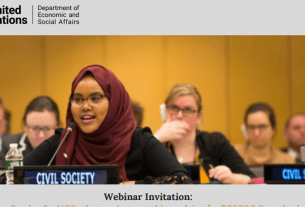The United Nations Commission on the Status of Women (CSW) was established in 1946 as a functional commission of the United Nations Economic and Social Council (ECOSOC). Its mandate is to promote gender equality and the empowerment of women. The commission meets annually for a two-week session in New York, during which member states, UN entities, and NGOs gather to assess progress on gender equality, identify challenges, and formulate concrete policies to address them. The commission also provides a platform for the formulation of international standards on women’s rights and gender equality. Over the years, the CSW has been instrumental in the development of international agreements and conventions on the rights of women, including the Convention on the Elimination of All Forms of Discrimination against Women (CEDAW) in 1979.
This year, 2023, marks the 67th session of the Commission on the Status of Women and will take place from 6 to 17 March 2023. Representatives of Member States, UN entities, and ECOSOC-accredited non-governmental organizations (NGOs) from all regions of the world are to the session.
Themes
- The 67th session of the United Nations CSW has chosen “Innovation and technological change, and education in the digital age” as its priority theme. The goal is to explore how these advancements can be leveraged to promote gender equality and empower all women and girls.
- Review theme: Challenges and opportunities in achieving gender equality and the empowerment of rural women and girls (agreed conclusions of the sixty-second session)
The 67th Pre-CSW Africa Consultations made recommendations on the following aspects:
- Access to digital tools, the internet, and relevant content for women and girls
- Data availability to support the gender-responsive innovation
- Human and Institutional Capacity in support of technology and innovation for women and girls
- Human rights and agency
- Digital safety for women and children
- Regional digital cooperation
The NGO Forum responsible for NGO registrations has published a ‘Zero Draft’ with key recommendations for the CSW67 Zero Draft. The Association of Rights of Girls (ARG) has formulated recommendations to be included in the Zero Draft for the 67th session of the United Nations Commission on the Status of Women (CSW67) on behalf of diverse groups of girls and women, including those who are underrepresented, rural, from grassroots and indigenous communities, widows, women on the move, women with disabilities, and LGBTQI+ people. These recommendations were developed after consulting with over 700 members of our global grassroots community, including members of global NGO CSWs, to understand their lived experiences. The recommendations focus on critical issues related to achieving gender equality and empowering all women and girls in the context of innovation and technological change, and education in the digital age. The ARG emphasizes that women and girls should be included in leadership and decision-making processes when implementing these five recommendations:
Ensure universal access to essential and gender inclusive public and private digital infrastructure including electricity and frontier data and Artificial Intelligence (AI) innovations to bridge existing digital divides.
recommendations by arg
1- Invest in and strengthen gender-responsive policies, programs and laws that prioritize girls and women in all their diversity. Eliminate the digital gender gap by providing them with critical digital fluency skills, ranging from basic digital literacy to advanced technical skills in science, technology, engineering and mathematics (STEM) and in information and communications technology (ICT).
2- Develop international standards and guidelines to address and eliminate the risks to the digital privacy and safety, autonomy, and dignity of women and girls in all their diversity. Women and girls of all ages are particularly at risk for online abuse, cyberbullying and gender-based violence stemming from the pervasive sexism and misogyny on digital platforms which thwart their fundamental human rights.
3- Ensure universal access to essential and gender inclusive public and private digital infrastructure including electricity and frontier data and Artificial Intelligence (AI) innovations to bridge existing digital divides. Guarantee access to digital technologies in rural areas and ensure equal opportunity particularly for older women and women with disabilities to be empowered with ICTs, through not only physical access and skills development, but also design that respects the needs of all people following consultation with those directly affected.
4- Enhance official development assistance commitments and improve public finance and investments, as well as leverage private sector partnerships, for universal, affordable, equal and unfettered access to digital technologies for women and girls in all their diversity. This can include, but is not limited to, free device distribution, creation of affordability schemes, and affordable data plans.
5- Engage with girls and young women in the formulation, design and development of adequately financed policies and programs that prioritize digital literacy skills, online safety, and STEM education for girls, young women and marginalized groups. Address unequal gender norms, policies and laws and lack of infrastructure that hinder girls’ access, engagement and safety with digital tools, ICT and STEM education.



